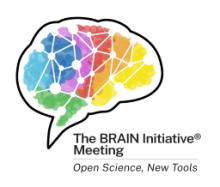
Please join us on June 12-13 at the BRAIN Initiative’s 9th Annual Meeting and hear from our three featured plenary speakers as they share their expertise and insights with the BRAIN research community. If you haven’t registered already, please join us virtually, as in-person registration has closed.
The 9th Annual BRAIN Initiative Meeting: Open Science, New Tools is coming up next month—and due to the BRAIN community’s enthusiasm, we’ve already reached in-person capacity for this hybrid event. But you may still register for virtual attendance and a waitlist for in-person registration has also been activated.
Virtual attendees will have digital access to the meeting’s exhibits and posters, keynote and symposia presentations and discussions, and more. We are looking forward to hearing from three notable and talented plenary speakers, who are each highlighted below. All session times are listed in Eastern Daylight Time (EDT).
Nita Farahany, J.D., Ph.D.

- Bio: Dr. Nita Farahany is the Robinson O. Everett Distinguished Professor of Law & Philosophy at Duke Law School and Founding Director of the Duke Initiative for Science & Society. She is a widely published scholar on the ethics of emerging technologies, including her recent [HN([1] book, The Battle for Your Brain: Defending the Right to Think Freely in the Age of Neurotechnology. She is an elected board member, fellow, reporter, and member of multiple technology and neuroscience institutions and agencies, including serving as Co-Chair of the BRAIN Neuroethics Working Group. Dr. Farahany is a co-editor-in-chief of the Journal of Law and the Biosciences and on the Board of Advisors for Scientific American. She also serves on multiple scientific and ethics advisory boards. Dr. Farahany holds an A.B. (genetics) from Dartmouth College, an A.L.M. (biology) from Harvard University, and a J.D., M.A., and Ph.D. (philosophy) from Duke University.
- Session Title: The Battle for Your Brain
- Session Date and Time: Monday, June 12 at 10:45 AM EDT
- Session Description: Many legal and ethical implications and dilemmas come with advanced technology and artificial intelligence applications in neuroscience. In the future, we could see these new technologies investigating what we think, feel, or why we change our behaviors. As tools like this continue to grow, we must consider what it means to be able to think freely and what policies should be in place to protect our mental privacy. While advanced neurotechnology has enormous potential for teaching us about the brain, Dr. Farahany will discuss what that information is worth and the fine lines between progress and fundamental human rights.
Sameer Anil Sheth, M.D., Ph.D.

- Bio: Dr. Sameer Anil Sheth is a professor, Cullen Foundation Endowed Chair, Vice-Chair of Research, and a McNair Scholar in the Department of Neurosurgery at the Baylor College of Medicine. Dr. Sheth directs the Gordon and Mary Cain Pediatric Neurology Research Foundation Laboratories at Texas Children’s Hospital and the Jan and Dan Duncan Neurological Research Institute. He graduated from Harvard University (physics and astronomy), then received his M.D. and Ph.D. degrees from the University of California, Los Angeles (UCLA), and trained in neurological surgery at Massachusetts General Hospital and Harvard Medical School. Dr. Sheth specializes in treating epilepsy, movement disorders, and psychiatric disorders. He also runs the Functional and Cognitive Neurophysiology Lab at Baylor College of Medicine, which conducts research to better understand brain function and develop new therapies for neurological and psychiatric conditions.
- Session Title: Psychiatric Neuromodulation: Pushing the Limits of Personalization
- Session Date and Time: Monday, June 12 at 4:00 PM EDT
- Session Description: Determining how to treat psychiatric conditions is one of the greatest challenges in neuroscience as we try to learn more about their neurophysiological basis. While we can better measure symptoms, phenotypes, and neural biomarkers of refractory conditions like epilepsy or movement disorders, investigating these in psychiatric conditions such as obsessive-compulsive disorder or depression require more advanced neuroimaging methods and technology. Dr. Sheth’s talk will discuss how invasive electrophysiological approaches and machine learning are helping us identify key biomarkers in psychiatric conditions so that we can understand the relationship between neural activity and symptom states in hopes of creating personalized psychiatric neuromodulation as treatment.
Vanessa Ruta, Ph.D.

- Bio: Dr. Vanessa Ruta’s lab at The Rockefeller University aims to elucidate how nervous systems are shaped by either individual experience or evolutionary selection to give rise to flexible variations in behavior. Her group leverages the concise chemosensory circuits of Drosophila to gain an integrative understanding of adaptive behaviors, from the structure of sensory receptors to the algorithms of complex motor behavior. Dr. Ruta received a B.A. in chemistry from Hunter College of CUNY and a Ph.D. from The Rockefeller University, where she worked with Dr. Rod MacKinnon. Dr. Ruta has received several honors and awards, including being named a MacArthur Fellow, a McKnight Scholar, a Pew Biomedical Scholar, and a New York Stem Cell Foundation–Robertson Neuroscience Investigator. Dr. Ruta was appointed as a Howard Hughes Medical Institute Investigator in 2021.
- Session Title: Circuit Mechanisms for Flexible and Adaptive Behaviors
- Session Date and Time: Tuesday, June 13 at 10:30 AM EDT
- Session Description: We know that animal behavior and psychology have an incredible range of diversity across species, but we don’t yet know exactly how neural circuits learn behavior. Dr. Ruta’s talk will highlight the multidisciplinary tools that her lab uses to explore the nervous system of Drosophilia and trace behaviors back to evolution or individual experience. This work helps us understand neural circuitry and uncover the neural mechanisms that are responsible for behavior variations in animals, to ultimately determine if we can alter behavior at the molecular level or in synaptic and circuit motifs.
Don’t miss out—register to virtually attend the Annual Meeting today! If you have any questions, please reach out to the meeting organizers at BrainInitiativeConferences@mail.nih.gov. This is a public event, so please feel free to share the news with your networks.
We look forward to sharing the latest discoveries in neuroscience and learning with you!
